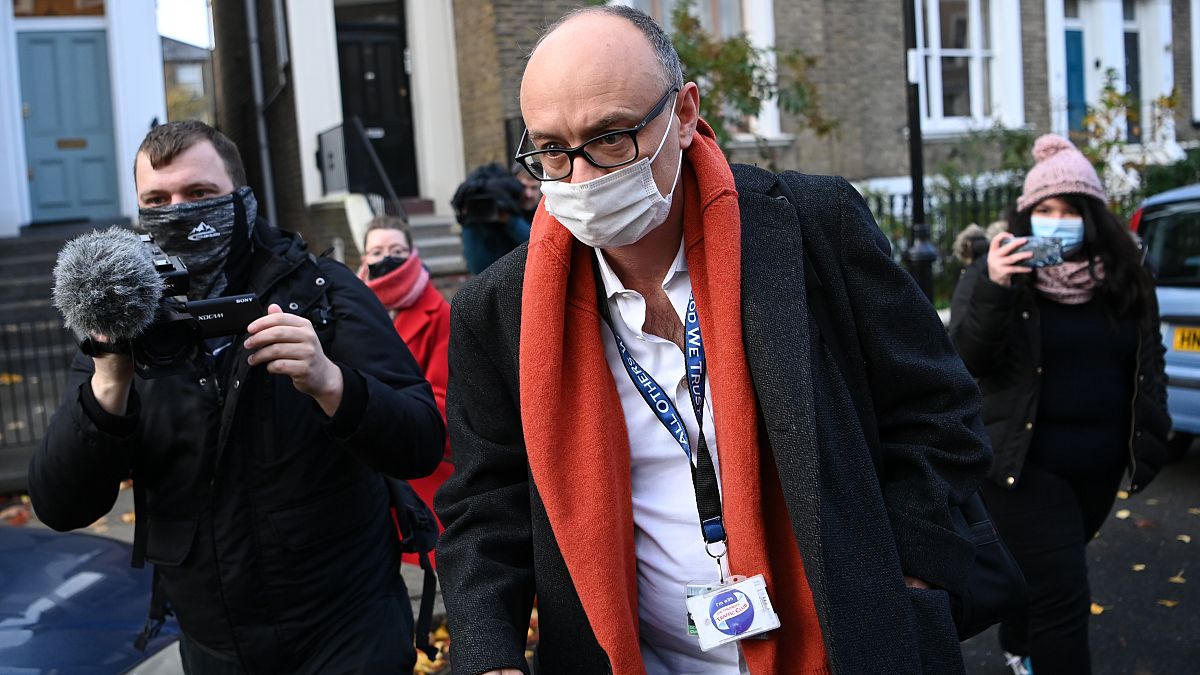Boris Johnson's office says his special adviser's abrupt departure does not change the government's insistence that an EU deal must respect UK sovereignty.
He was the chief architect of the campaign to take the UK out of the EU, but he has left the stage just as Brexit's future shape is about to be determined.
Dominic Cummings, top adviser to Prime Minister Boris Johnson, was pictured walking out of 10 Downing Street by the front door on Friday night, carrying a box.
But Downing Street flatly denies that the change implies adopting a softer stance with the European Union as talks reach a crucial stage. A spokesman described such a claim as "false", adding that the government's position was "unchanged" and that Boris Johnson wanted a deal which "totally" respected UK sovereignty.
Cummings' departure, which a government source said would be official from "mid-December", follows the resignation earlier in the week of Lee Cain, Johnson's director of communications. This came amid reports of bitter arguments among rival factions also involving the prime minister's fiancée Carrie Symonds.
Both Cain and Cummings worked together on the "Vote Leave" campaign in the 2016 Brexit referendum that was largely fronted by Johnson.
Their exit comes as negotiations between London and Brussels to conclude a deal on trade and future relations go down to the wire. The post-Brexit transition period expires on December 31 and any agreement needs time to be ratified and for preparations to be made.
Reports quoting insiders suggest that the upheaval in Downing Street over the past week had little or nothing to do with the Brexit negotiations.
Cummings has been at the centre of a bruising battle for influence at the heart of the government. Unpopular among many ruling Conservative MPs, he sparked a furore earlier this year when he drove hundreds of miles across England after contracting COVID-19, violating national lockdown rules.
Boris Johnson is thought to want to steer his government towards more conciliatory, less combative waters -- in sharp contrast to the tone often adopted under Cummings' influence. The arrival of Joe Biden in the White House from next year could also be a factor.
However, there are reports of tensions within the cabinet over a potential no-deal Brexit scenario.
On Sunday the UK's chief negotiator David Frost arrived in Brussels for yet more talks with his EU counterpart Michel Barnier. In a Twitter thread he reiterated that a deal would have to respect UK sovereignty, acknowledging that "we may not succeed".
Talks have been taking place amid a near-total media blackout. But although Lord Frost spoke of "some progress" there is still no sign of a breakthrough.
Negotiations have been stuck on key issues including fishing rights and competition rules, and have been soured further by the government's UK Internal Market Bill. The legislation currently going through parliament breaches international law and reneges on part of the binding Brexit divorce deal over arrangements for Northern Ireland.
Deal or no deal, January 1 will bring major changes to trading arrangements between the UK and the EU. New customs formalities and regulatory controls will kick in when the UK leaves the bloc's economic embrace.
But the extra red tape, costs and disruption will be exacerbated unless a deal is struck very soon, and this at a time when both sides are battling to contain the raging coronavirus pandemic and its economic fallout.
EU affairs blogger Jon Worth told Euronews that the chances of a no-deal stand at 50% at the moment - but "whatever happens, there's going to be disruption ahead" anyway.
If a no-deal happens, however, it could be "perhaps easier for Downing Street to communicate to the British population", he added, "because they can point the finger at Brussels saying 'Look, all of this crisis that we face...it is all the fault of Michel Barnier and the European Commission'."
"If Boris does do a deal, and then there is still chaos, it is actually harder for him to sell to the British public. So it's still on a knife-edge," Worth said.
Watch the interview in the video player above.
